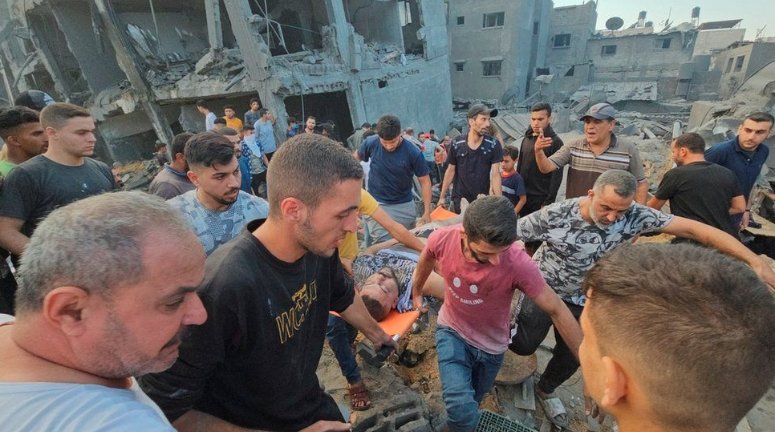What happened at Jabalia camp?
An explosion rocked the Jabalia refugee camp in northern Gaza on Wednesday, killing at least 50 people and injuring many more. The blast occurred in a residential area, where several apartment blocks were destroyed by the impact. The Hamas-run health ministry said the explosion was caused by an Israeli air strike, but the Israeli military has not confirmed or denied this claim.
The Jabalia camp is the largest of Gaza’s eight refugee camps, with more than 116,000 Palestinian refugees registered there by the UN. It is located near the border with Israel, where the Israeli army has been conducting ground operations since last week. Israel has warned residents in northern Gaza to evacuate their homes for their safety, but many have stayed behind.
Why is Israel attacking Gaza?
The latest escalation of violence between Israel and Hamas, the militant group that controls Gaza, began on October 7, when Hamas fired rockets at Israel, killing 1400 people. Hamas said it was retaliating for Israel’s killing of four of its members in a drone strike. Israel responded with air strikes and artillery fire, targeting Hamas’s military infrastructure and leaders.
Since then, more than 8500 people have been killed in Gaza, according to the Hamas-run health ministry. Israel says it has killed hundreds of militants and destroyed dozens of tunnels and rocket launchers. Israel also says it is defending itself from thousands of rockets fired by Hamas and other groups in Gaza, which have killed dozens of people and damaged buildings and infrastructure in Israel.
How is the world reacting to the crisis?
The international community has expressed alarm and concern over the humanitarian situation in Gaza, where more than 1.8 million people live under a blockade imposed by Israel and Egypt since 2007. The UN says more than half of the population lacks access to clean water, electricity, food and medical supplies. The UN also says more than 300,000 people have been displaced by the fighting and are sheltering in schools, mosques and other buildings.

Many countries have called for an immediate ceasefire and a political solution to end the conflict. The US, Israel’s main ally, has said it supports Israel’s right to self-defense, but has also urged it to avoid civilian casualties and de-escalate the situation. The US has also sent an envoy to the region to mediate between the parties. Egypt, Qatar and Turkey have also been involved in diplomatic efforts to broker a truce.
What are the prospects for peace?
The prospects for peace between Israel and Hamas are bleak, as both sides have rejected each other’s conditions for a ceasefire. Hamas has demanded that Israel lift the blockade on Gaza and stop its military operations. Israel has demanded that Hamas stop firing rockets and disarm its armed wing. Neither side seems willing to compromise or trust the other.
The conflict is also complicated by the internal divisions among the Palestinians and the Israelis. Hamas is considered a terrorist organization by Israel, the US and many other countries, and does not recognize Israel’s right to exist. Hamas is also rival to Fatah, the party that controls the West Bank and is recognized by most of the world as the legitimate representative of the Palestinians. Fatah and Hamas have been at odds since 2007, when Hamas seized control of Gaza after winning elections.
On the Israeli side, Prime Minister Benjamin Netanyahu is facing political pressure from his right-wing coalition partners and his opponents, who accuse him of either being too soft or too hard on Hamas. Netanyahu is also facing corruption charges and an uncertain future after failing to form a government following four inconclusive elections in two years.
What will happen next?
The fate of Gaza and its people hangs in the balance as the fighting continues with no end in sight. The explosion at Jabalia camp has added to the death toll and the misery of the civilians caught in the crossfire. The question remains: will there be a ceasefire or a ground invasion? Will there be a humanitarian intervention or a humanitarian catastrophe? Will there be a dialogue or a deadlock? Will there be peace or war?


















